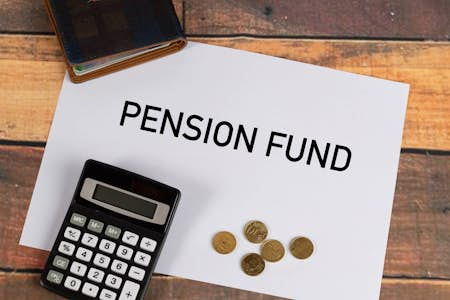At its most basic level, a pension is a fund that supports you later in life when you retire.
Pensions are a tax-efficient method of saving for retirement; they help protect your money and earnings for use in the future.
Maximise your retirement fund with our panel of pension providers. Click on your chosen provider to get started!
You may already receive a pension from an employer, or any past employers, also known as a workplace pension.
Since 2008, employers have to auto-enrol specific staff into a pension scheme by law unless they specifically choose to opt-out.
You can also receive a State Pension or can choose to invest in a personal or individual pension.
You’re not limited to one option. Most people will receive a State Pension and a workplace pension of some description.
Pensions provide tax advantages as contributions from both yourself and your employer are subject to tax relief.
What is the purpose of a pension?
Pensions are designed to help us save for the futures.
The first state Old Age Pension was introduced in the UK in 1909.
Pensions cushion the loss of income experienced after retirement. They secure our financial futures beyond working age which benefits both the individual and the state, which is why the government offers a State Pension!
The three types of pensions
Let’s break down the three main types of pension available in the UK:
- State pension
- Workplace pensions
- Individual or personal pensions
What is the State Pension?
You will automatically pay into your State Pension using National Insurance contributions. You must reach the State Retirement age - currently 65 or 66-years-old - to start receiving it.
For those retiring on or after 6th October 2020, the state retirement age is 66. It will rise to 67 and again to 68 for both men and women in the coming years.
You can use this government tool to calculate your State Retirement age.
The government will pay a regular fixed pension rate to you once you reach retirement age. This rises in line with inflation. It’s important to remember that the structure and value of the State Pension can change any year.
The amount you’ll get will depend on your lifetime National Insurance contributions. You’ll get the maximum amount if you have 35 qualifying years of contributions. You’ll need at least ten qualifying years to receive any State Pension payment at all.
What is a workplace pension?
A workplace pension is organised by your employer. Currently, your employer must make a minimum 3% contribution to your pension pot (that you wouldn’t receive in your wages otherwise), and you will have to make a minimum 5% contribution from your salary.
Employer contributions for defined benefit pensions can be much higher - up to 15% in some cases.
If you’re aged between 22 and State Pension age, work in the UK and earn more than £10,000 a year, your employer is obliged to auto-enrol you into a workplace pension scheme.
There are two main types of workplace pensions:
- Defined contribution - money paid into a defined contribution scheme is invested by the pension provider. Once the policy matures when you reach retirement age, the amount you’ll get will depend on how well the investments have performed. This provides you with a means to beat inflation, as the hope is that your savings will grow in value.
- Defined benefit - also known as final salary pensions. The money you’ll receive from these workplace pension schemes is not based on investments but on your salary and how long you’ve worked for an employer.
What are defined contribution pensions?
Defined contribution pensions are pensions that you (and possibly your employer if this is also a workplace pension) pay into throughout your life.
These payments are invested for the long-term into shares or bonds. This is now the most common pension that you’ll receive from private sector employment.
Some defined contribution schemes allow you to buy an annuity after 55, which provides you with an income for life.
You can also choose a pension drawdown scheme where you can take money from your pension pot when you want. We’ll explore this point in more detail shortly.
You can choose to take the whole pot as a lump sum if you wish.
What are defined benefit pensions?
Defined benefit contributions calculate your pension payouts based on your salary and employment history with an employer(s). They provide a promised retirement income based on your salary.
These are more common in the public sector than in the private sector.
What is an individual/personal/private pension?
Personal pensions, stakeholder pensions or self-invested personal pensions (SIPPs) are instigated and maintained entirely by yourself. Self-employed individuals and other business owners typically choose these.
These are typically a form of defined contribution pension; the provider will invest your money into shares and bonds.
Some are managed by investment professionals, whereas others allow you to manage your investments.
The maximum you can invest in a personal pension and claim tax relief on is 100% of your earnings, up to £40,000 a year. You can carry forward unused allowances from the previous three tax years. To carry forward, you must make the maximum allowance of contributions in the current tax year (currently £40,000 for 2021/2022) before using the unused allowances from the previous three tax years. You can’t receive tax relief on contributions that exceed your earnings in that tax year.
There is a lifetime allowance of £1,073,100 that you can build up in your pensions before you have to pay additional tax.
This additional tax is only paid on pension savings that exceed the lifetime allowance. The current taxes are:
- 55% if withdraw contributions over the allowance as a lump sum
- 25% if you withdraw it in any other way
What is a pension fund?
A pension fund is a type of investment fund specifically designed for retirement.
You will encounter the term ‘pension fund’ when you start a workplace pension or private/personal pension.
Both your own and your employer’s contributions as well as any tax relief will be invested into the fund.
When your employer approaches you with your pension fund options, most people will typically choose the default fund. These are designed for long-term, stable growth. Typical investment types include shares, bonds, property and cash.
Some companies may offer more exotic options when it comes to pension funds. With a personal or private pension, you’ll have greater control over your options.
Typical characteristics that you‘ll be able to choose include risk profile, investment location and shares type.
For example, you may be given ethical pension fund options that don’t involve investing in ‘sin stocks’ like fossil fuel, arms or weaponry and gambling.
When it comes to defined benefit schemes, also known as final salary pensions, the company or organisations board and trustees will manage the funds. You’ll have little control over the investments they choose. However, but they promise a specific retirement income, so there is little to no risk.








